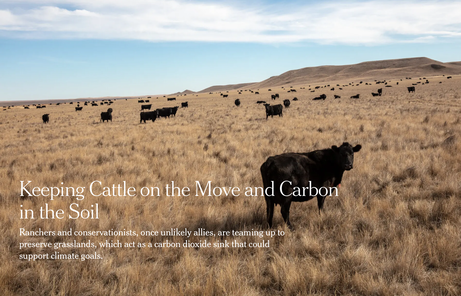
Keeping Cattle on the Move and Carbon in the Soil
The New York Times, October 2021
Whether the prairies of North America, the savannas of Africa and South America, the steppes of Eurasia, or the Pampas of South America, grasslands are in crisis. A nascent movement seeks to save these biomes and leverage their power as a carbon sink and source of biodiversity. Great Plains Cattle ranchers are using regenerative methods to improve the health of the grasslands.
The New York Times, October 2021
Whether the prairies of North America, the savannas of Africa and South America, the steppes of Eurasia, or the Pampas of South America, grasslands are in crisis. A nascent movement seeks to save these biomes and leverage their power as a carbon sink and source of biodiversity. Great Plains Cattle ranchers are using regenerative methods to improve the health of the grasslands.
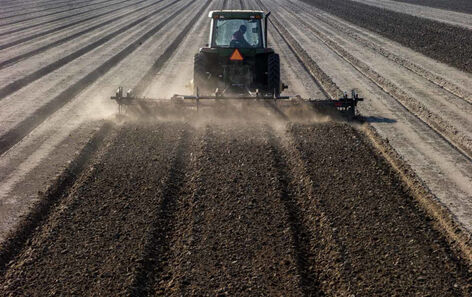
This California Law Offers Biden a Tool in the Fight for Environmental Justice
The Nation, December 2020
California's landmark 2017 environmental justice law seeks to address air pollution hotspots in state-designated disadvantaged communities by putting concerned citizens at the table on committees charged with developing mitigation plans. Berkeley researchers argue that the law could inspire regulatory actions by the Biden administration's EPA.
The Nation, December 2020
California's landmark 2017 environmental justice law seeks to address air pollution hotspots in state-designated disadvantaged communities by putting concerned citizens at the table on committees charged with developing mitigation plans. Berkeley researchers argue that the law could inspire regulatory actions by the Biden administration's EPA.
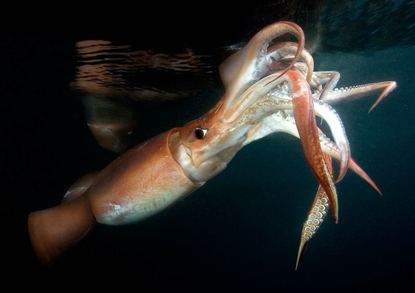
Managing the Majestic Jumbo Flying Squid
The New York Times, June 2020
Multiple studies have found that climate change’s striking impact on the oceans — through warming, acidification, declining oxygen content and shifts in currents — is driving marine-creature territories in a mass shift away from the tropics and toward the poles. Jumbo squid have been expanding further down Chile's coastline, bringing economic opportunities, but also raising conflicts over the precious resource.
The New York Times, June 2020
Multiple studies have found that climate change’s striking impact on the oceans — through warming, acidification, declining oxygen content and shifts in currents — is driving marine-creature territories in a mass shift away from the tropics and toward the poles. Jumbo squid have been expanding further down Chile's coastline, bringing economic opportunities, but also raising conflicts over the precious resource.
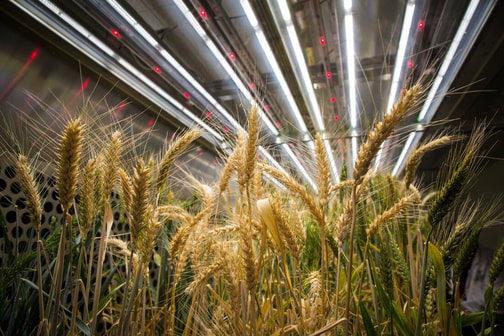
To Feed a Hot Planet, They're Making More Efficient Plants
The New York Times, September 2019
To save the world from massive food shortages and cascading geopolitical crises, Australian agricultural researchers, along with their global colleagues and counterparts, need to cultivate crops that can achieve unprecedented bounty in ever harsher and more unpredictable conditions and yet thrive with fewer resources—including land, water and fertilizer—than today’s varieties.
The New York Times, September 2019
To save the world from massive food shortages and cascading geopolitical crises, Australian agricultural researchers, along with their global colleagues and counterparts, need to cultivate crops that can achieve unprecedented bounty in ever harsher and more unpredictable conditions and yet thrive with fewer resources—including land, water and fertilizer—than today’s varieties.
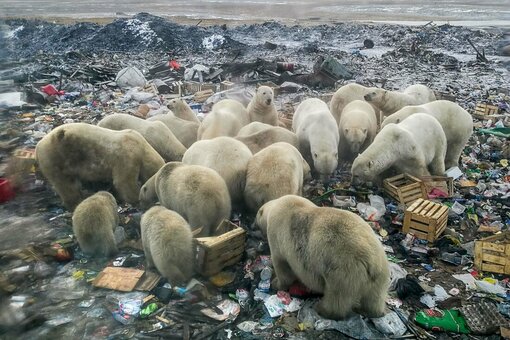
These Days, It's Not About the Polar Bears
The New York Times, May 2019
The United States has a serious climate-denial problem. Enter the fast-growing academic field of climate change communication. Across a swath of mostly Western nations, social scientists in fields like psychology, political science, sociology and communications studies have produced an expansive volume of peer-reviewed papers in an effort to cultivate more effective methods for getting the global warming message across and inspiring action.
The New York Times, May 2019
The United States has a serious climate-denial problem. Enter the fast-growing academic field of climate change communication. Across a swath of mostly Western nations, social scientists in fields like psychology, political science, sociology and communications studies have produced an expansive volume of peer-reviewed papers in an effort to cultivate more effective methods for getting the global warming message across and inspiring action.